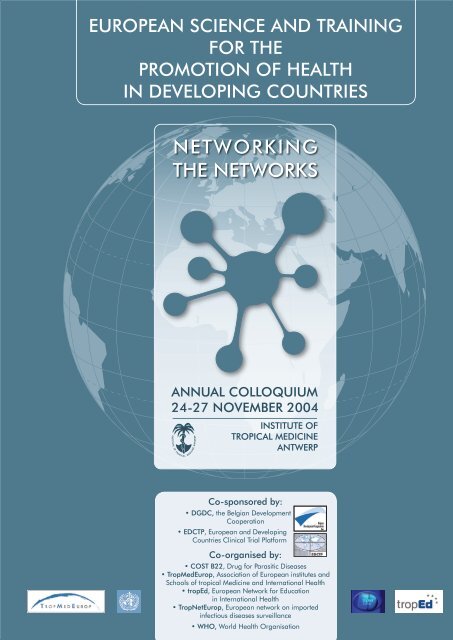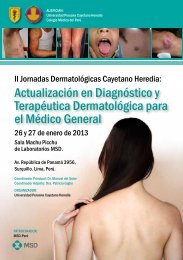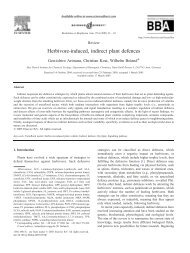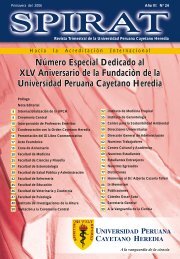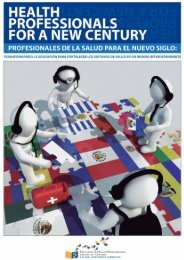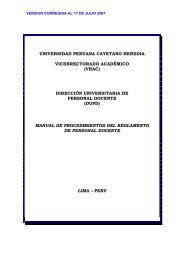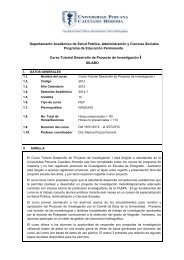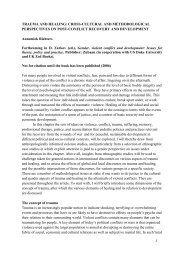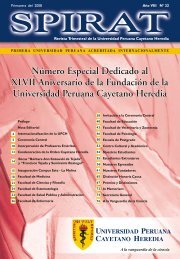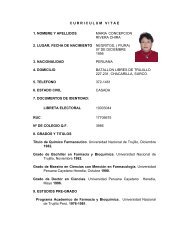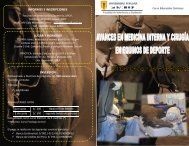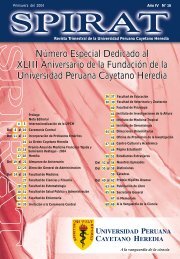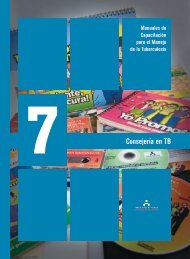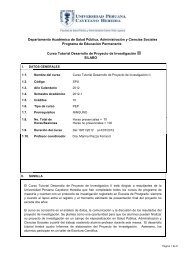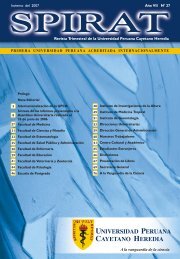NETWORKING THE NETWORKS - UPCH
NETWORKING THE NETWORKS - UPCH
NETWORKING THE NETWORKS - UPCH
You also want an ePaper? Increase the reach of your titles
YUMPU automatically turns print PDFs into web optimized ePapers that Google loves.
EUROPEAN<br />
<strong>NETWORKING</strong><br />
SCIENCE<br />
<strong>THE</strong> <strong>NETWORKS</strong><br />
AND TRAINING<br />
FOR titel <strong>THE</strong><br />
PROMOTION OF HEALTH<br />
IN DEVELOPING COUNTRIES<br />
<strong>NETWORKING</strong><br />
<strong>THE</strong> <strong>NETWORKS</strong><br />
ANNUAL COLLOQUIUM<br />
24-27 NOVEMBER 2004<br />
INSTITUTE OF<br />
TROPICAL MEDICINE<br />
ANTWERP<br />
Co-sponsored by:<br />
• DGDC, the Belgian Developmentxxxxx<br />
Cooperation<br />
• EDCTP, European and Developingxxxxxxxxx<br />
Countries Clinical Trial Platformxxxx<br />
Co-organised by:<br />
• COST B22, Drug for Parasitic Diseases<br />
• TropMedEurop, Association of European institutes and<br />
Schools of tropical Medicine and International Health<br />
• tropEd, European Network for Education<br />
in International Health<br />
• TropNetEurop, European network on imported<br />
infectious diseases surveillance<br />
1<br />
• WHO, World Health Organisation
<strong>NETWORKING</strong> <strong>THE</strong> <strong>NETWORKS</strong><br />
BACKGROUND<br />
Ill-health has ever been a major burden on daily life and general development in developing countries. Over<br />
the past decade, the spread of AIDS and old scourges such as malaria and TB, the emergence of new morbidity<br />
and failing public services, and the vicious cycle between poor health and poverty has brought entire countries<br />
and regions to the brink of disaster. A quick and decisive response should be an overriding priority for the affected<br />
countries as well as the international community. Apart from the humanitarian obligation, the impact on<br />
global prosperity and stability could otherwise be devastating.<br />
While still being minute in comparison to military investments, political awareness in South and North have<br />
led to a number of global health initiatives and the commitment of substantial resources. The coherence and<br />
efficiency of the programmes is not yet optimal, and funds as well as absorption capacity are still far from sufficient.<br />
Yet, if the current efforts can be further strengthened, improved and sustained, hope for better access to<br />
health and health care is around the corner for millions of people.<br />
Obviously, the affected countries must lead the programmes at the national and international level, and have<br />
(or must develop) the necessary capacity to that end. Yet, the challenges are so enormous and complex that<br />
the developed countries must not only provide money, but also whatever expertise they can deliver. However,<br />
they should avoid renewing the North-South dominance of the past, which has contributed all too often to the<br />
failure of meeting the true needs of the populations.<br />
Social equity and accessible quality health care are main fundaments of most European nations and the European<br />
Union. In spite of persisting injustices, the European Union and its members are, on aggregate, the main<br />
partners of many developing countries. Both in terms of expertise and resources, Europe can thus contribute<br />
significantly to better health care for their populations. This much-needed impact does not yet reach its full<br />
potential, however, due to the fragmentation of many European efforts.<br />
The co-ordination of development aid is mainly a matter of political will, and progress is being made. Scientists<br />
across Europe, of various disciplines contributing to international health development, have over the past<br />
decades taken several initiatives of their own to coordinate scientific research, advanced training, expert support<br />
and policy development in the field of international health. By the very nature of Europe, this is a matter<br />
of networking rather than centralisation. Formal and informal networks are now active in education, research<br />
and service delivery. Many have overlapping objectives and constituencies; most consist of a variety of (often<br />
the same) institutes, departments or individuals from Europe and, in most cases, also from the South. Yet, there<br />
has been no structured exchange or co-ordination between the networks far.<br />
New European initiatives, such as those expressed in the Declaration of Lisbon (strengthening and bundling<br />
scientific research) and the Declaration of Bologna (es-tablishing a European Higher Education Area) provide<br />
new momentum and perspec-tives for these networks. The European Union and individual members countries<br />
also provide instruments and resources to foster scientific cooperation, both within Europe and with the developing<br />
countries.<br />
One of the earliest programmes is COST (European Co-ordination in the field of Scientific and Technical Research),<br />
for the co-ordination of nationally funded research. The COST-action B22 on “Drug development for<br />
parasitic diseases” is an example of such long-standing networks; while most of the work is laboratory-based,<br />
it is directly related to health in developing countries and it involves a good number of partners from the<br />
South. Previous EU Research Framework Programmes (FP) have created many small and temporary, projectbased<br />
networks under the STD and INCO schemes, which among themselves were loosely connected in thematic<br />
“contract holder groups” (e.g. on malaria, schistosomiasis, health systems research...). While not being<br />
structural, the dynamics of these have often been perpetuated in long-standing north-north and north-south<br />
collaborative links. Under the FP5 and FP6 programmes, several “Concerted Actions” and “Accompanying<br />
measures” supported the co-ordination (but not the research as such) of larger groups. The Sixth Framework<br />
Programme takes the dynamics one step further by creating large “Networks of Excellence” and “Integrated<br />
3
<strong>NETWORKING</strong> <strong>THE</strong> <strong>NETWORKS</strong><br />
BACKGROUND<br />
Projects” which bring together most if not all important players in the EU and their international partners in<br />
a given field, supporting not only co-ordination but also joint projects. Finally, the European & Developing<br />
Countries Clinical Trial Partnership (EDCTP) for the first time joins “national programmes” , and this in a separate<br />
and autonomous legal structure. Each of these models can be seen as a step further towards European<br />
integration, but in practice also show the many political, operational and managerial difficulties that have to<br />
be faced.<br />
Other networks are more generic or demand-driven by nature. TropMedEurop (TME) is an association of institutes<br />
and schools of tropical medicine, which so far has concentrated on information exchange, joint advocacy<br />
and offshoots, but is seeking to play a more active role in European and international fora. tropEd (European<br />
Network for Education in International Health) is a network of TME members and other academia that organise<br />
jointly a modular advanced Masters in International Health. TropNetEurop (European Network on Imported<br />
Infectious Disease Surveillance) monitors main tropical import diseases in Europe. ENIVD (European Network<br />
for Diagnostics of Imported Viral Diseases) has been set up with support of the EU to monitor the possible<br />
introduction of haemorrhagic and other viral fevers in Europe. Several other networks and initiatives have a<br />
less pronounced but yet distinct European dimension, and/or are less explicitly aimed at but yet relevant for<br />
developing countries.<br />
As the pressing needs in the field demand optimal coordination and efficiency, and in view of the new perspectives<br />
and instruments for European integration, it would obviously be useful for the existing networks working<br />
on international health development to exchange information and experiences, on their work as well as on<br />
their organisation model.<br />
4
<strong>NETWORKING</strong> <strong>THE</strong> <strong>NETWORKS</strong><br />
<strong>THE</strong> COLLOQUIUM<br />
The Institute of Tropical Medicine of Antwerp (ITM) organises each year a colloquium on a topic of current<br />
relevance in tropical medicine and international health develop-ment, with support from the Belgian<br />
Ministry of Development Cooperation and other authorities and organisations. The specific aim is to bring<br />
together experts from different disciplines and backgrounds, and to ensure a balanced participation from<br />
South and North.<br />
The ITM, active in many European and international networks, offers its 2004 colloquium as a forum<br />
for the various European networks active in international health development to exchange information<br />
and experiences, analyse opportunities for interaction and synergism, and possibly to structure future<br />
exchanges. This exercise will be done in dialogue with partners and actors from the South and with input<br />
from other international networks and initiatives. The meeting hopes to contribute to the bottom-up<br />
dynamics needed to structure a European “space” for scientific research, education and expertise for the<br />
improvement of health in developing countries. The venue will be Antwerp, 24-26 November 2004. Before<br />
and after the meeting the ITM is offering facilities for networks that wish to combine the colloquium<br />
with an internal (or joint) meeting.<br />
The EDCTP, as a front runner and challenging experiment of European integration in the field of poverty-related<br />
diseases, will be a main co-sponsor of the event. Besides co-ordinating the national programmes<br />
for EDCTP-specific activities, it intends to link up also to relevant networks for training, capacity<br />
strengthening, pre- and postclinical research. These networks may learn from, and be inspired by the<br />
EDCTP experi-ences – and vice versa. In the long term, a succesful EDCTP may become the cata-lyst for<br />
further co-ordination and integration of the European efforts to improve health care and the fight against<br />
poverty-related diseases in developing countries. There-fore, the EDCTP-model will be in focus in most<br />
sessions.<br />
The participants and target audience of the colloquium will be:<br />
• Networks with a European dimension, active in scientific research, education or expertise in the field of<br />
tropical and poverty-related diseases and health care organisation in developing countries.<br />
• South-partners of these networks and other representatives of developing coun-tries active in those fields<br />
• Representatives of other interested networks, organisations or international ini-tiatives<br />
• National and international authorities<br />
European networks that have so far confirmed their commitment include:<br />
• EDCTP - European and Developing Countries Clinical Trial Platform (EDCTP): a network of National Programs<br />
for clinical trials and capacity strengthening for AIDS, TB and Malaria from 15 European countries<br />
and their African partners, co-funded by the EU<br />
• COST B22 - Drugs for Parasitic Diseases: a EU-supported network of research for anti-parasitic drug<br />
development<br />
• TropMedEurop, the Association of European Institutes and Schools of Tropical Medicine and International<br />
Health<br />
• tropEd, European Network for Education in International Health, organising a modular Masters of Science<br />
programme with 28 partner institutions from 13 countries.<br />
• TropNetEurop, the European network on imported infectious diseases surveil-lance<br />
• Several EU/FP6 Networks of Excellence (NoE), Integrated Projects (IP) or con-certed actions (CA)<br />
The ITM will invite and support a substantial number of experts from developing countries, among others directors<br />
or representatives from key partner institutes in Africa, Asia and Latin America. Also COST, EDCTP and<br />
possibly other participating EU-networks will bring in a number of partners from the South.<br />
5
<strong>NETWORKING</strong> <strong>THE</strong> <strong>NETWORKS</strong><br />
OBJECTIVES<br />
Other relevant networks and organisations with a European component or support may be interested to join<br />
the initiative. While this meeting seeks mainly to encourage the bottom-up dynamics of networking, obviously<br />
it is hoped that also the concerned authorities and officials from the EU and from national governments will be<br />
interested to participate in the debates.<br />
The objectives and agenda of the meeting are:<br />
• To exchange and disseminate information on the objectives, structure and activities of the various networks<br />
• To analyse their contribution to a “European Scientific Space” for research, education and training, expertise<br />
and policy development in international health;<br />
• To analyse their contribution to the improvement of health and relevant capacity building in developing<br />
countries<br />
• To identify and structure potential areas of collaboration, co-ordination, synergy as well as current overlaps<br />
between different networks, areas (e.g. training and research), disciplines (e.g. shortening the development<br />
pipeline of new products) and thematic fields (e.g. different diseases).<br />
• To exchange experiences and problems related to the structure, mechanisms, management and funding<br />
of the networks<br />
• To jointly reflect on further needs and possible steps for strengthening European and international coordination<br />
and positioning in the scientific fields related to international health development<br />
• To provide an early feed-back on the outcomes of the Global Forum for Health Research summit (Mexico,<br />
16-20 November 2004)<br />
Agenda<br />
The objectives of the meeting will be pursued through presentations and discussions on concrete issues, by<br />
highlighting and discussing the role of networking in different aspects of research, education, capacity building<br />
and international cooperation. All sessions will be in plenary. The agenda can be found on the next pages. At<br />
this stage, suggestions are still welcome.<br />
6
<strong>NETWORKING</strong> <strong>THE</strong> <strong>NETWORKS</strong><br />
PROGRAMME<br />
( minor modifications are still possible)<br />
MONDAY 22 NOVEMBER - WEDNESDAY 24 NOVEMBER 12 am<br />
• Opportunities and facilities for internal or joint meetings of the networks<br />
• Poster session: presentation of other participating networks (throughout whole meeting)<br />
WEDNESDAY 24 NOVEMBER - Afternoon<br />
14.00 – 18.00 Session 1: introducing the networks<br />
14.00 – 14.20 Welcome address<br />
Objectives of the colloquium<br />
Organisers<br />
14.20 - 14.40 Views and needs from the South<br />
Dicky Akanmori, Developing Countries Coordination Committee, EDCTP<br />
14.40 – 15.10 Feedback from the Health Research Summit<br />
Yogan Pillay, INCO – Health Systems Expert Group<br />
15.10 – 15.40 Coffee break<br />
15.40 – 17.00 Presentation of the co-organising European networks<br />
• Tropmedeurop<br />
• TropEd<br />
• TropNetEurop<br />
• EDCTP<br />
• COST - drugs<br />
Network representatives: Rainer Sauerborn*, Carsten Mantel, Tomas Jelinek,<br />
Piero Olliaro, Fred Opperdoes<br />
17.00 – 17.30 Models, management and quality of networking<br />
Barbara Simaeys, South Research<br />
17.30 – 18.00 Discussion<br />
19.30-21.30 Academic and official session (2)<br />
19.30 – 19.50 Official addresses<br />
National and European authorities<br />
19.50 – 20.10 Keynote lecture: Global health challenges and development<br />
Pascoal Mocumbi, Haut Representative, EDCTP<br />
20.10 - 20.30 Rolling out antiretroviral therapy: the case of South-Africa<br />
Fatima Hassan, TAC<br />
20.30 – 21.30 Reception and snacks<br />
7<br />
* to be confirmed
<strong>NETWORKING</strong> <strong>THE</strong> <strong>NETWORKS</strong><br />
PROGRAMME<br />
THURSDAY 25 NOVEMBER<br />
9.00 – 13.00 Session 3: Networking in Research - from molecule to patient<br />
9.00 – 10.30 Discovery and development<br />
• Microbicides research, Guido Vanham, EMPRO<br />
• Vaccine research: malaria, Sodiomon Sirima, AMANET<br />
• Diagnostics: Tuberculosis, Juan-Carlos Palomino, ITM<br />
• Diagnostics: HIV, Souleymane Mboup, CHU-Dakar<br />
• Drugs for neglected diseases, Simon Croft, COST and DNDi<br />
10.30 - 11.00 Coffee break<br />
11.00 - 12.30 • Intra-EU programmes and their implication for Developing Countries,<br />
Tomas Jelinek, TropNetEurop<br />
• EDCTP: the first year, Piero Olliaro, EDCTP<br />
Operational research :<br />
• Effectiveness and intervention trials, Fred Binka, Partnership Board, EDCTP*<br />
• Bottlenecks for new interventions in health care systems, Francine Matthys, ITM<br />
12.30 - 13.00 Panel discussion: how can networking shorten and improve the development pipeline?<br />
13.00 - 14.00 Lunch<br />
14.00 – 17.30 Session 4: Networking in health policy and research<br />
14.00 - 15.45 Getting research into policies and practices<br />
• Health system research in INCO-DEV: lessons from the past for the future,<br />
Goran Tomson, EU/INCO Health Systems Expert Team<br />
• Health ministries and research, Chhi Vun Mean, MOH-Cambodia<br />
• Development agencies and research, NN, DFID<br />
• Research agencies and development, Coenraad Krijger, NWO, The Hague<br />
• European academia and international health policies, Don de Savigny, STI-Basel<br />
• NGO’s and international health policies: the case of TRIPS, Ellen ‘t Hoen, MSF*<br />
15.45 - 16.15 Coffee break<br />
16.15 - 17.00 Case study: networking for monitoring of drug resistance<br />
• Malaria , T.K. Mutabingwa, EANMAT, Tanzania<br />
• Tuberculosis, Armand Van Deun, ITM/WHO collaborating centre<br />
17.00 – 17.30 Panel discussion: how can networking strengthen policies and practices of health care<br />
and disease control?<br />
19.00 Visit to town hall, reception and conference dinner<br />
8<br />
* to be confirmed
<strong>NETWORKING</strong> <strong>THE</strong> <strong>NETWORKS</strong><br />
PROGRAMME<br />
FRIDAY 26 NOVEMBER<br />
9.00 – 13.00 Session 5: Networking for education, training and capacity building<br />
9.00 - 11.00 Individual capacity strengthening<br />
• The European Higher Education Area: new opportunities for joint training<br />
programmes in international health, Carsten Mantel, tropEd, Berlin<br />
• Joint North-South training programmes, NN, STI, Basel<br />
• Doctoral and post-doctoral training, Stuart Anderson, LSHTM, London<br />
• Career structures for developing countries scientists,<br />
NN, CAMES, Abidjan<br />
• Institutional partnerships for training, Sylvia Sax, University of Heidelberg<br />
11.00 - 11.30 Coffee break<br />
11.30 - 12.30 Institutional capacity strengthening<br />
• North-South and South-South partnerships, Hannah Akuffo, SIDA<br />
• Models and case studies: how can developing countries take the lead?<br />
Eduardo Gotuzzo, UP-Cayetano Heredia Lima, Ho Dinh Tring, NIMPE-Viëtnam<br />
12.30 - 13.00 Panel discussion:<br />
The role of networks in capacity strengthening and innovative training initiatives<br />
13.00 - 14.00 Lunch<br />
14.00 - 16.00 Session 6: Conclusion<br />
• Summary of the meeting, Rapporteurs<br />
• Panel and plenary discussions: EU-officials, representatives from networks<br />
Europe and international health<br />
Relation between EU networks and developing countries<br />
Outcome of the meeting: networking the networks<br />
• Conclusion and closure , Organisers<br />
FRIDAY 16.00 – 19.00 and SATURDAY 9.00 - 18.00:<br />
Opportunities and facilities for internal or joint network meetings<br />
* to be confirmed<br />
9
<strong>NETWORKING</strong> <strong>THE</strong> <strong>NETWORKS</strong><br />
ORGANISATION<br />
Organisation Contact ITM Liaison<br />
EDCTP<br />
COST - B22<br />
Piero Olliaro<br />
Katelijne van Diest<br />
Fred Opperdoes<br />
Simon Croft (now DNDi)<br />
Bruno Gryseels<br />
Jan Coenen<br />
Stanny Geerts<br />
Marleen Boelaert<br />
TropMedEurop Bruno Gryseels Bruno Gryseels<br />
Dirk Van der Roost<br />
TropEd<br />
Axel Hoffman<br />
Govert van Heusden<br />
Carsten Mantel<br />
TropNetEurop Thomas Jelinek Jan Clerinx<br />
Jef Van den Ende<br />
Over-all coordination<br />
Bruno Gryseels<br />
Dirk Van der Roost<br />
Secretariat<br />
Danielle van Melle<br />
Kristien Wynants<br />
Jef van Lint<br />
Lieve Schueremans<br />
10
<strong>NETWORKING</strong> <strong>THE</strong> <strong>NETWORKS</strong><br />
PRACTICALITIES<br />
VENUE AND LANGUAGE<br />
Registration will take place on Wednesday 24 November 2004 at Fortis Bank, Wapper, Antwerp, between<br />
12.00 and 14.00.<br />
All the sessions will take place in the auditorium of the Fortis Bank. The colloquium language is English.<br />
The Academic Session on 24 November will take place at Elzenveld, Lange Gasthuisstraat 45, Antwerp.<br />
The walking dinner on 25 November will take place at the City Hall of Antwerp.<br />
ABSTRACTS AND POSTER PRESENTATIONS<br />
Oral presenters: in order to ensure a smooth running of the event, it would be help-ful if you could also<br />
let us have a copy of your final presentation in Powerpoint by 15 November 2004. If you intend to use<br />
another medium for your presentation, please inform the scientific secretariat in good time.<br />
Poster presenters: presentation panels will be at your disposal for presenting your network. The size of the<br />
panels is H 200 cm x W 95 cm.<br />
Flyers: tables will be placed at the entrance of the auditorium where you can put flyers or other documents<br />
presenting your network.<br />
FACILITIES FOR <strong>NETWORKING</strong><br />
Before and after the meeting (22-24 and 26-27 November) the ITM is offering facilities for networks that<br />
wish to combine the colloquium with an internal (or joint) meet-ing.<br />
If you need a meeting room, please contact Mrs. Danielle Van Melle at dvmelle@itg.be, mentioning the<br />
name of your network, the meeting time, the ex-pected number of participants, coffee breaks.<br />
REGISTRATION AND FEES<br />
Please return the registration form with a certified cheque (or a copy of the bank transfer). After payment,<br />
participants will receive a confirmation.<br />
The deadline for registration is 22 October 2004.<br />
The registration fee is 120 Euro<br />
The registration fee covers:<br />
• Reception and walking dinner on 25 November at the City Hall, Antwerp<br />
• Abstract book and programme<br />
• Admission to all sessions<br />
• Coffee breaks and lunches<br />
Cheques should be issued in Euro and made payable to the “Institute of Tropical Medicine – Colloquium<br />
2004”. All bank expenses are to be paid by the participant. Payment by bankers draft should be credited to<br />
11
<strong>NETWORKING</strong> <strong>THE</strong> <strong>NETWORKS</strong><br />
PRACTICALITIES<br />
account N° 604-4495281-33 (IBAN BE 79-604-4495281-33, Swift Code BLGO BE BB) at Bank Belgolaise,<br />
Kan-tersteen 1, B-1000 Brussels, Belgium.<br />
Cancellations received in writing before 10th November 2003 are subject to an 80% reimbursement of the<br />
registration fee. No refunds can be made thereafter.<br />
MISCELLANEOUS<br />
Participants are advised to check the validity of their passport and the requirements for a visa. A letter of invitation<br />
can be obtained from the colloquium secretariat upon request but is not a commitment for the payment<br />
of any expenses.<br />
The Colloquium organisers are not responsible for any loss, accident or injury that may occur during the<br />
meeting. Participants are advised to obtain appropriate travel and health insurance. Participants with an acute<br />
health problem can rely on the dis-pensary of ITM for medical assistance.<br />
In November, the average temperature in Belgium can be as low as 0°C and it may be rainy. The congress<br />
venue is located in the middle of Antwerp’s main shopping area and near the historical centre.<br />
ACCOMODATION AND TRANSPORT<br />
Participants have to arrange their own accommodation. Hotel rooms can be booked by sending the enclosed<br />
accommodation form directly to the hotel of your choice.<br />
TRANSPORT AND APPROXIMATE FEES:<br />
Arrival at Brussels<br />
Airport Taxi to Antwerp 60 €<br />
Sabena shuttle to Antwerp Central Station 8 €<br />
Arrival at Antwerp Airport<br />
Taxi to hotel 20 €<br />
Taxi Antwerp Central Station to hotel 12 €<br />
HOW TO REACH <strong>THE</strong> FORTIS BANK (congress venue)<br />
From Brussels National Airport (Zaventem):<br />
Sabena shuttle to Antwerp Central Station<br />
Brussels – Antwerp : every hour<br />
First bus at 7 a.m.<br />
Last bus at 11 p.m.<br />
Price : 8 €<br />
(Sabena shuttle Antwerp – Brussels : every hour)<br />
First bus at 5.30 a.m. Last bus at 10 p.m.)<br />
From Antwerp Central Station:<br />
12
<strong>NETWORKING</strong> <strong>THE</strong> <strong>NETWORKS</strong><br />
PRACTICALITIES<br />
Walking distance to congress venue: 10 minutes<br />
Alternative: Subway n° 2 or 15, direction<br />
“Linkeroever” – stop “Meir”<br />
From Antwerp Airport<br />
Bus N° 16 – Stop Antwerp Central Station<br />
At central Station, subway N° 2 or 15, direction “Linkeroever” – stop “Meir”<br />
HOTELS IN <strong>THE</strong> NEIGHBOURHOOD OF <strong>THE</strong> CONGRESS VENUE<br />
Please fax the annexed “hotel registration form” to the hotel of you choice.<br />
For the Hilton hotel, please use the “Hilton” hotel registration form.<br />
60 rooms have been reserved at IBIS hotel for the participants.<br />
HOTEL IBIS (150 rooms) (please use the hotel registration form)<br />
Meistraat 39 - 2000 Antwerp<br />
Phone: 32-3-231.88.30 - Fax : 32-3-234.29.21<br />
Walking distance from congress venue: 5 minutes<br />
Room charge (breakfast included): single 77 €<br />
double 90 €<br />
ALFA <strong>THE</strong>ATER HOTEL (127 rooms) (please use the hotel registration form)<br />
Arenbergstraat 30 - 2000 Antwerp<br />
Phone: 32-3-231.17.20 - Fax : 32-3-233.88.58<br />
Walking distance from congress venue : 5 minutes<br />
Room charge (breakfast included): single 165 €<br />
double 185 €<br />
HOTEL CAMMERPOORTE (24 rooms) (please use the hotel registration form)<br />
Nationalestraat 38 – 40<br />
2000 Antwerpen<br />
Phone: 32-3-231.97.36 - Fax : 32-3- 226.29.68<br />
Walking distance from congress venue: 15 minutes<br />
Room charge (breakfast included) single 75 €<br />
double 90 €<br />
HOTEL RUBENSHOF (24 rooms) (please use the hotel registration form)<br />
Amerikalei 115-2000 Antwerp<br />
Phone: 32-3-237.07.89 - Fax : 32-3-248.25.94<br />
Walking distance from congress venue: 30 minutes<br />
Room charge (breakfast included) single 50 €<br />
double 63 €<br />
ANTWERP HILTON (211 rooms) (please use the “Hilton” hotel registration form)<br />
Groenplaats - 2000 Antwerp<br />
Phone: 32-3-204.12.12 - Fax : 32-3-204.12.13<br />
Walking distance from congress venue : 10 minutes<br />
Room charge (excl. breakfast ) single/double 230 €<br />
Parking place is available (paying)<br />
13


